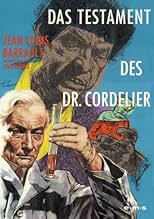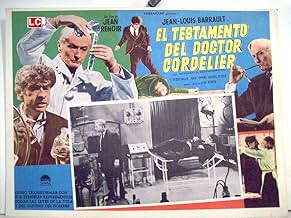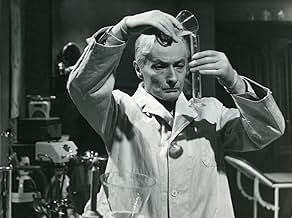O Testamento do Dr Cordelier
Título original: Le testament du Docteur Cordelier
AVALIAÇÃO DA IMDb
6,5/10
1,4 mil
SUA AVALIAÇÃO
Adicionar um enredo no seu idiomaMr. Joly, doctor Cordelier's lawyer, is amazed to discover that his client and friend leaves his possessions to a stranger, Opale, a sadistic criminal. He needs this man to prove that people... Ler tudoMr. Joly, doctor Cordelier's lawyer, is amazed to discover that his client and friend leaves his possessions to a stranger, Opale, a sadistic criminal. He needs this man to prove that people's behavior can be adjusted at will...Mr. Joly, doctor Cordelier's lawyer, is amazed to discover that his client and friend leaves his possessions to a stranger, Opale, a sadistic criminal. He needs this man to prove that people's behavior can be adjusted at will...
- Direção
- Roteiristas
- Artistas
- Direção
- Roteiristas
- Elenco e equipe completos
- Produção, bilheteria e muito mais no IMDbPro
Avaliações em destaque
When the lawyer Joly (Teddy Bilis) receives the testament of his friend and psychiatrist Dr. Cordelier (Jean-Louis Barrault), Joly realizes that he is giving all his fortune and assets to his unknown patient Opale. When Joly learns that Opale is an evil man, he believes his friend is being threatened or blackmailed by Opale. Soon Opale murders a man on the street and the psychiatrist Dr. Lucien Séverin (Michel Vitold), who has a beef with Dr. Cordelier due to his experiments. After a party at Dr. Cordelier's house, his butler Désiré (Jean Topart) summons Joly since Dr. Cordelier has locked himself in the laboratory and now he is screaming in pain. Joly and Dr. Cordelier's employees break in the laboratory and find Opale inside. He asks to everyone but Joly to leave the laboratory and gives a tape to the lawyer to learn what happened with Dr. Cordelier.
"Le testament du Docteur Cordelier" is a film by Jean Renoir that retells the same story of "Strange Case of Dr Jekyll and Mr Hyde" (1886), by Robert Louis Stevenson, but set in Paris in the 50's. Maybe in 1959 it was a good movie for television, but today is a predictable rip-off of the famous novel. My vote is six.
Title (Brazil): "O Testamento do Dr. Cordelier" ('The Testament of Dr. Cordelier")
"Le testament du Docteur Cordelier" is a film by Jean Renoir that retells the same story of "Strange Case of Dr Jekyll and Mr Hyde" (1886), by Robert Louis Stevenson, but set in Paris in the 50's. Maybe in 1959 it was a good movie for television, but today is a predictable rip-off of the famous novel. My vote is six.
Title (Brazil): "O Testamento do Dr. Cordelier" ('The Testament of Dr. Cordelier")
This is the only version of "Dr. Jekyll and Mr. Hyde" that enables the viewer to watch the story as if it were new. It's the only one in which the fantastic events proceed from commonplace surroundings: it's set contemporaneously and shot like a documentary program. It's also the only one in which the two characters are believably distinct: one would never guess that the fussy, ascetic Jekyll and the careless, garish Hyde could be the same man. It's the only version that makes clear Jekyll's hypocrisy, which was the point Stevenson was emphasizing and which I never understood before: what Jekyll's friend can't understand--the reason Jekyll blocks the investigation of Hyde's crimes--is not that the criminal has some hold over him, but that he himself is the criminal and is protecting his own good name. Barrault's make-up as Hyde is rudimentary compared to the elaborately gruesome make-ups of the other versions, but what he makes of the character is far more meaningful. This Hyde is comic until he turns violent; he's a cross between Chaplin's tramp, a juvenile delinquent of the 50's, and an aboriginal--figures that can all be seen as embodiments of anarchy. He does exactly as his impulses compel him. Jekyll does the same--but while his patients are anesthetized, so they won't know. This version of "Jekyll", without special effects or filmic style and in modern dress, is the only serious one. I think Stevenson would have respected it.
There is a quasi-prologue to introduce Cordelier, which goes a long way to connecting this TV-based production with other self-reflexive films Renoir made late in his career. Space is not explored or constructed in the same was as films like M. Lange or Regle while a lack of mobile framing maintains psychological identification with the characters. There is deep space, but not deep staging as the camera frames long corridors and archways but not groups of characters within the settings. There are situations where groups of townspeople move around together but it is a group held together tenuously and usually motivated by reactions to an event. The women in the building knew of Opale but found no reason to report his odd behavior underscoring that the milieu is very different from that of Lange, Illusion, Fonds or Regle. Some of the performances suffer from affectation which tends to diminish the impact of the Barrault roles. Dr. Cordelier has a moment while reading the newspaper where the audience is privy to an internal monologue - heightening the psychological dimensions of the narrative. There is some splattering of the famous Renoir stylistics when the doctor's party is thrown and later when the collective of workers attempt to stop Opale. Yet, soon after a flashback sequence puts things right back into the realm of the psychological (theatrical) as opposed to the social (realist). The themes of sexual perversion are somewhat muted (or perhaps they require a more 'European eye' to appreciate). The freedom that Cordelier experiences through subscribing to chaos has interesting political implications. In some manner, I feel that Cordelier is one of Renoir's more clearly political films. The narrative frame returns Renoir to the screen and the storyworld diegetic. The compulsion of the nature of humanity (quest of soul will be punished but will be freedom) echoes the true significance of a film like Regle - these films are connected philosophically, if not also thematically. Cordelier is well worth watching for the dynamic combination of Renoir and Barrault using the multiple camera shooting system. There is an even flow to the storytelling that renders the text engaging.
GPeoples-2 Made a comment about the lead actor's "rudimentary's make-up". The fact is Barrualt used no make-up, or camera tricks in his transformation. Barrualt was one of the most respected mime artists ever to live, displaying his talents in "Les Enfants du Paradise", and this brilliant film. His transformation is absolutely brilliant, and quite shocking to watch. Jean Renoir was one of the best directors who ever lived, and the fact that he made this brilliant made for TV film so late in his career, 1959, is a testament to his talents as a director and storyteller.
If you can get a hold of this film I don't think you'll be disappointed.
If you can get a hold of this film I don't think you'll be disappointed.
I can see what everyone who enjoyed the movie sees in the film. There are quite a lot of good intentions in this one. Still the execution (I guess because it was made for TV) is not up to other Renoir movies. It also has dated quite badly. On the other hand, I watched the dubbed version, so I can only criticize the voices that were used, but I can also say that the body acting wasn't up to any good.
It's a shame that this didn't work for me, as it did for some people here, because I love quite a few Renoir movies and I was looking forward to this one. Yes there is a twist to the story, but I actually don't think it is that big a deal. Just because other movies who have adapted this, haven't gone that route (if you wanna know what this is based on, read the other reviews, many do write about it, I don't want to spoil it, in case you wanna watch the movie).
It's a shame that this didn't work for me, as it did for some people here, because I love quite a few Renoir movies and I was looking forward to this one. Yes there is a twist to the story, but I actually don't think it is that big a deal. Just because other movies who have adapted this, haven't gone that route (if you wanna know what this is based on, read the other reviews, many do write about it, I don't want to spoil it, in case you wanna watch the movie).
Você sabia?
- CuriosidadesThis TV program later had a theatrical release.
Principais escolhas
Faça login para avaliar e ver a lista de recomendações personalizadas
Detalhes
Bilheteria
- Orçamento
- FRF 60.000.000 (estimativa)
- Tempo de duração1 hora 35 minutos
- Cor
- Mixagem de som
- Proporção
- 1.33 : 1
Contribua para esta página
Sugerir uma alteração ou adicionar conteúdo ausente

Principal brecha
By what name was O Testamento do Dr Cordelier (1959) officially released in Canada in English?
Responda























